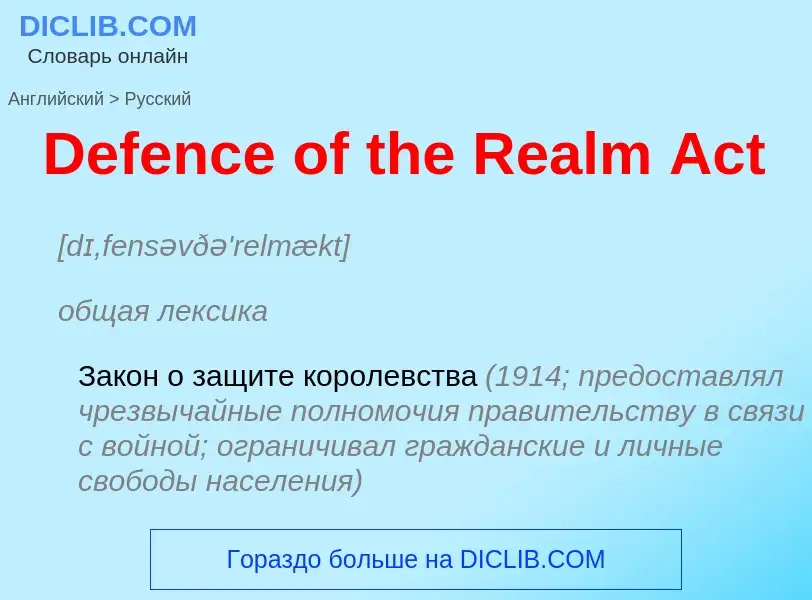Tradução e análise de palavras por inteligência artificial ChatGPT
Nesta página você pode obter uma análise detalhada de uma palavra ou frase, produzida usando a melhor tecnologia de inteligência artificial até o momento:
- como a palavra é usada
- frequência de uso
- é usado com mais frequência na fala oral ou escrita
- opções de tradução de palavras
- exemplos de uso (várias frases com tradução)
- etimologia
Defence of the Realm Act - tradução para russo
[dɪ,fensəvðə'relmækt]
общая лексика
Закон о защите королевства (1914; предоставлял чрезвычайные полномочия правительству в связи с войной; ограничивал гражданские и личные свободы населения)
['dɔ:rə]
сокращение
от Defence of the Realm Act
[kə'mɪtɪsteɪdʒ]
общая лексика
стадия комитета (рассмотрение законопроекта в парламенте между вторым чтением [second reading] и стадией доклада [report stage], когда палаты в полном составе объявляют себя комитетом; законопроект рассматривается во всех деталях; вносятся поправки, могут добавляться новые статьи)
парламентское выражение
стадия комитета (рассмотрение законопроекта в комитете, состоящем из всех членов палаты)
синоним
Definição
Wikipédia
The Defence of the Realm Act (DORA) was passed in the United Kingdom on 8 August 1914, four days after it entered the First World War and was added to as the war progressed. It gave the government wide-ranging powers during the war, such as the power to requisition buildings or land needed for the war effort, or to make regulations creating criminal offences.
DORA ushered in a variety of authoritarian social control mechanisms, such as censorship:
"No person shall by word of mouth or in writing spread reports likely to cause disaffection or alarm among any of His Majesty's forces or among the civilian population"
Anti-war activists, including John MacLean, Willie Gallacher, John William Muir, and Bertrand Russell, were sent to prison. The film, The Dop Doctor, was prohibited under the act by the South African government with the justification that its portrayal of Boers during the Siege of Mafeking would antagonise Afrikaners.
The trivial peacetime activities no longer permitted included flying kites, starting bonfires, buying binoculars, feeding wild animals bread, discussing naval and military matters or buying alcohol on public transport. Alcoholic drinks were watered down and pub opening times were restricted to 12pm–3pm and 6:30pm–9:30pm (the requirement for an afternoon gap in permitted hours lasted in England until the Licensing Act 1988).
In 1920 DORA was extended to deal with the violence in Ireland (see Irish War of Independence) with the Restoration of Order in Ireland Act 1920. That Act (under Section 3(6)) allowed military authorities to jail any Irish person without charge or trial and was repealed in 1953.

![Zeppelin raids]] in mail}} Zeppelin raids]] in mail}}](https://commons.wikimedia.org/wiki/Special:FilePath/Postal censorship message 1916 IWM Documents.8252.jpg?width=200)
.png?width=200)
.png?width=200)
.png?width=200)
![Scrolls containing acts of Parliament in the [[Parliamentary Archives]] at Victoria Tower, [[Palace of Westminster]] Scrolls containing acts of Parliament in the [[Parliamentary Archives]] at Victoria Tower, [[Palace of Westminster]]](https://commons.wikimedia.org/wiki/Special:FilePath/Parliamentary archives.jpg?width=200)
